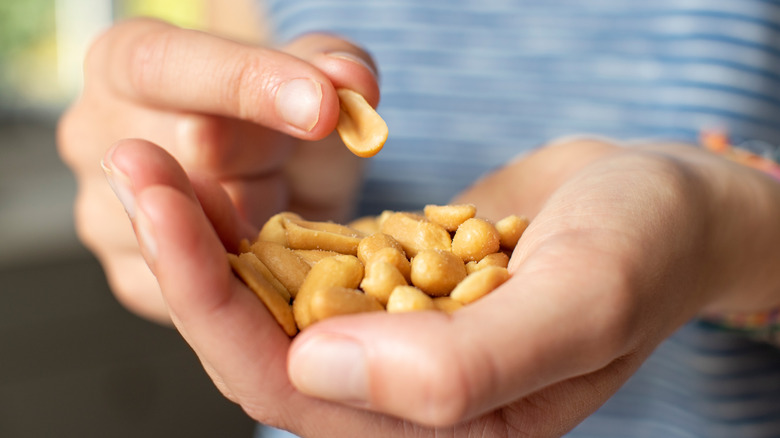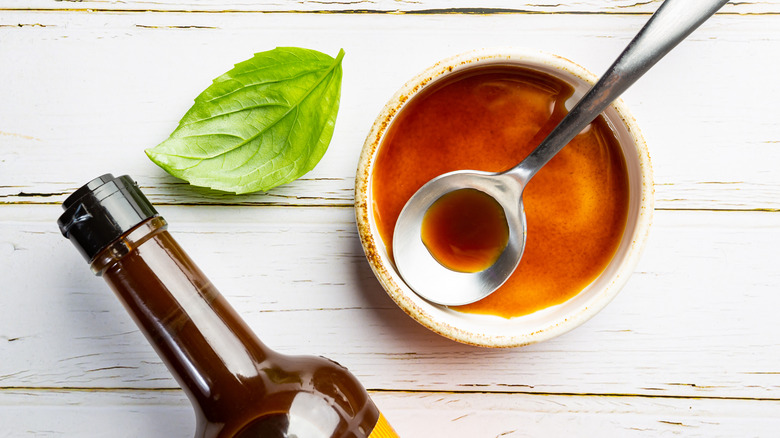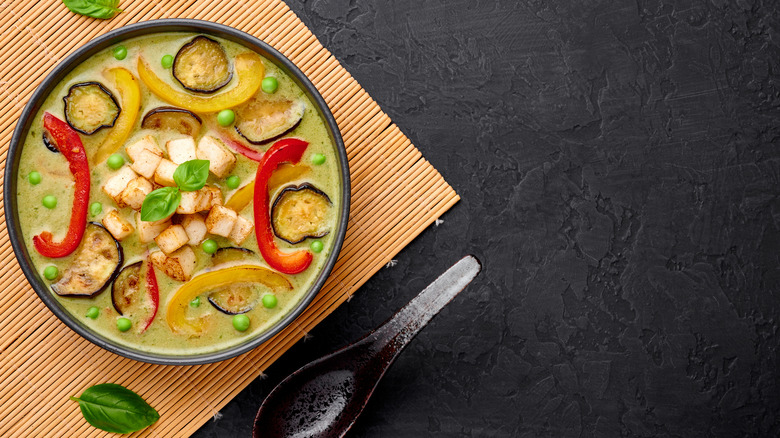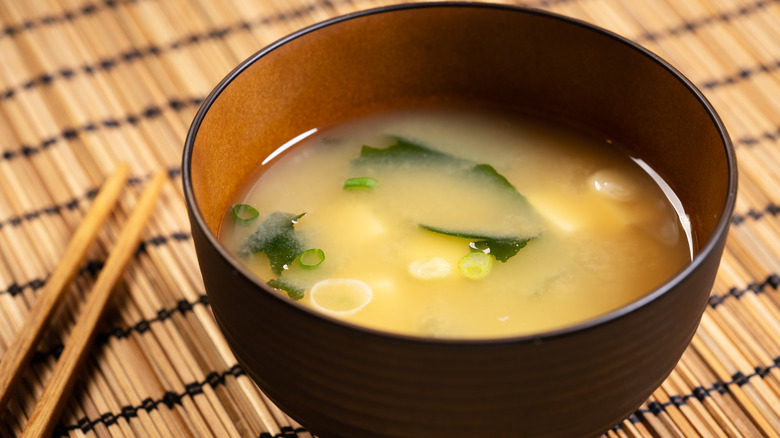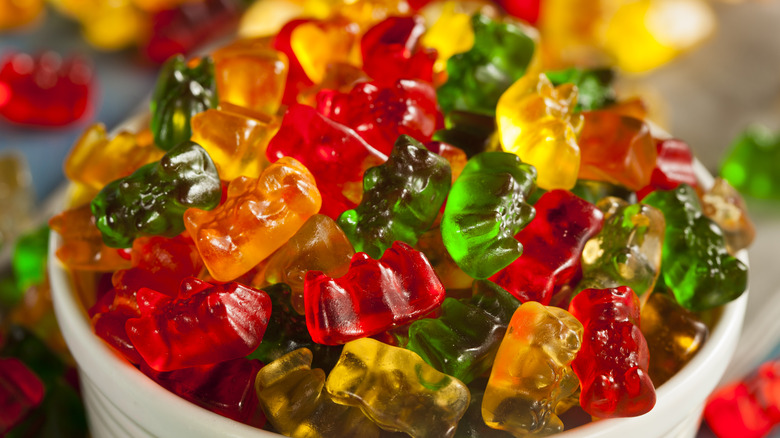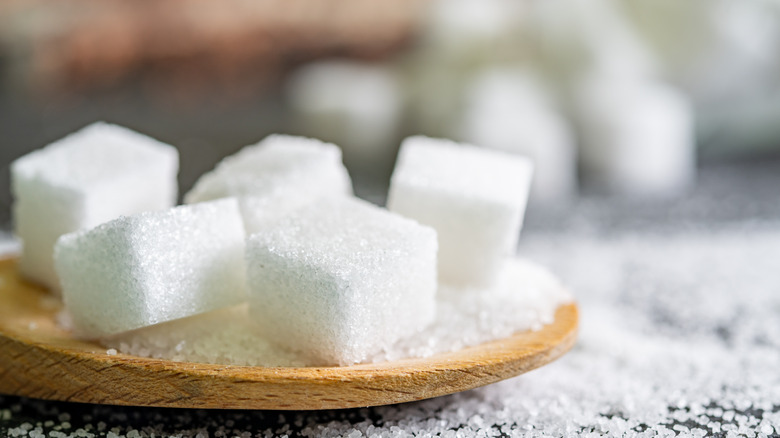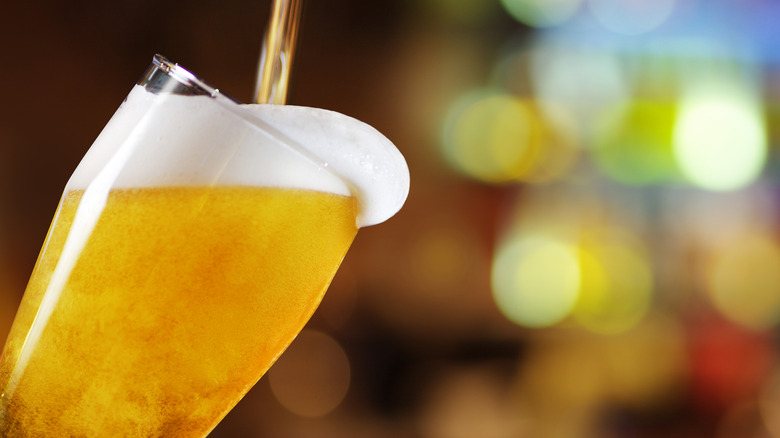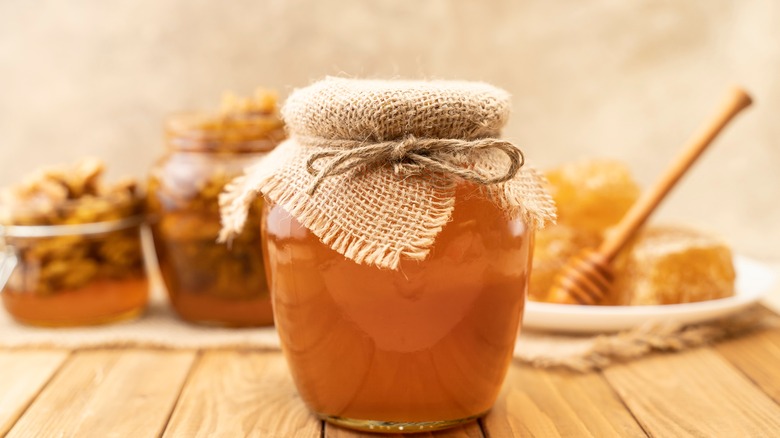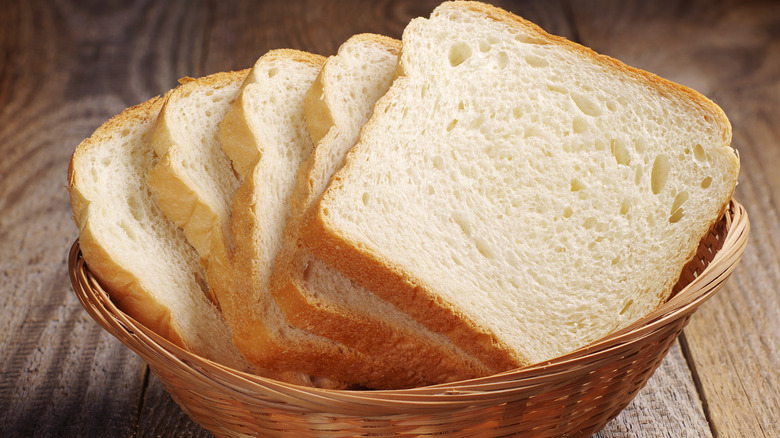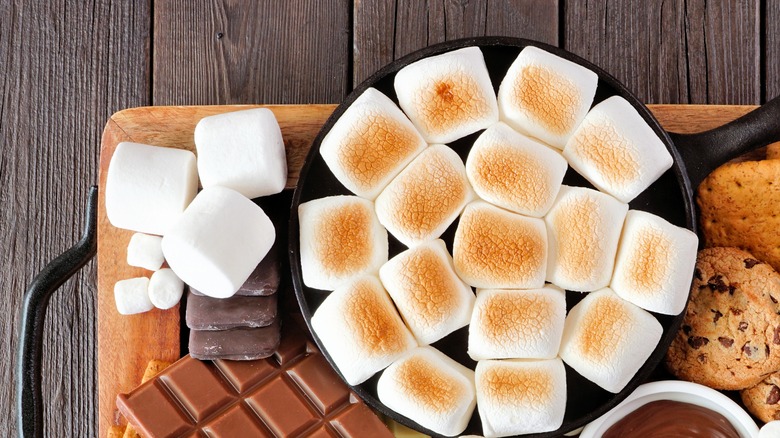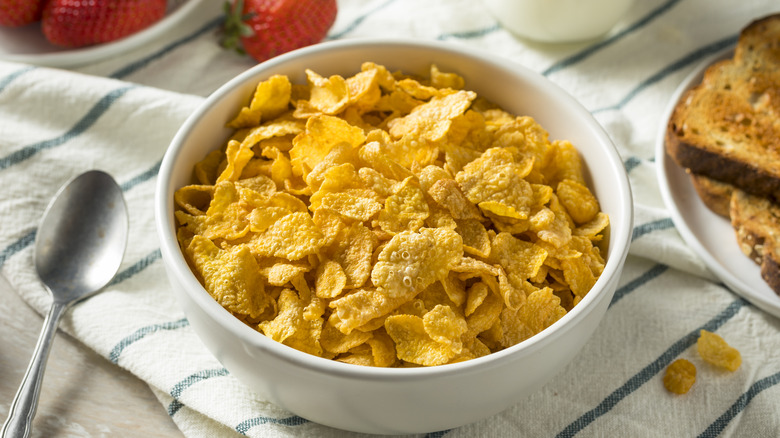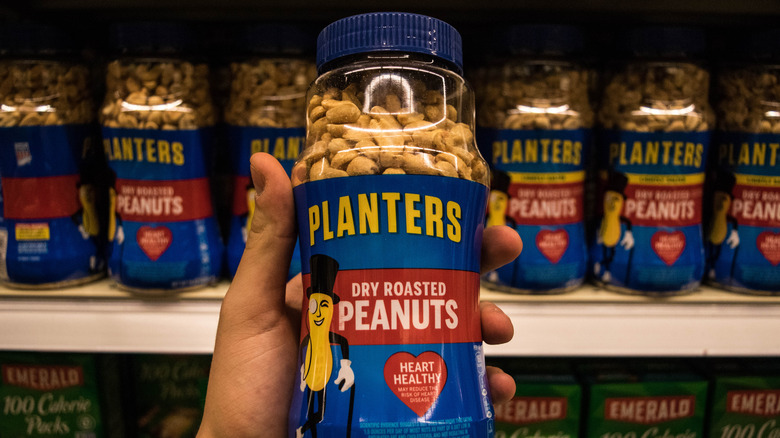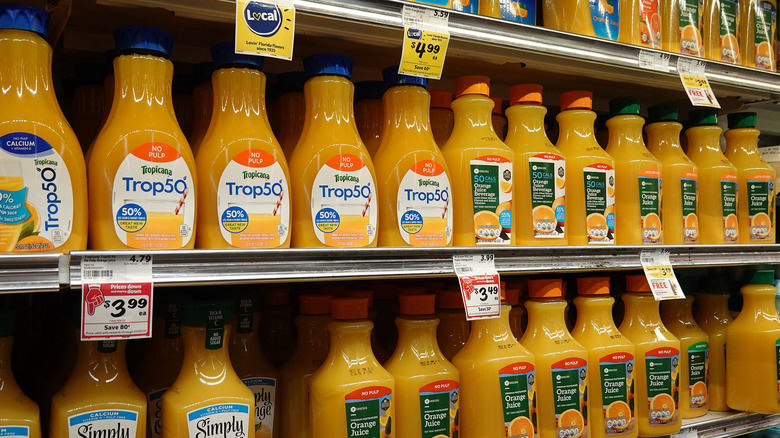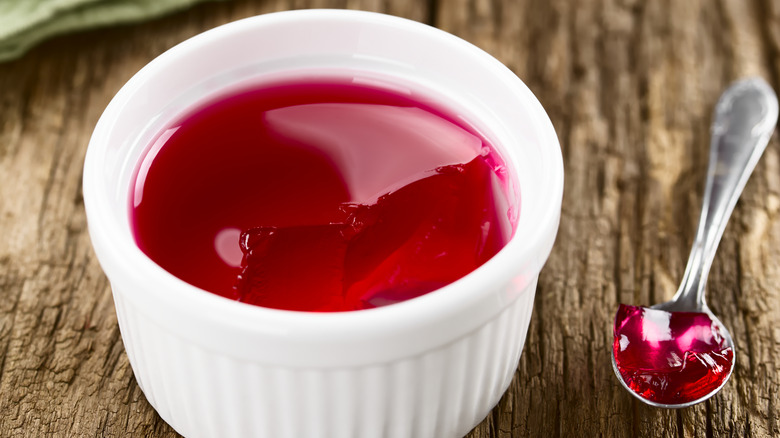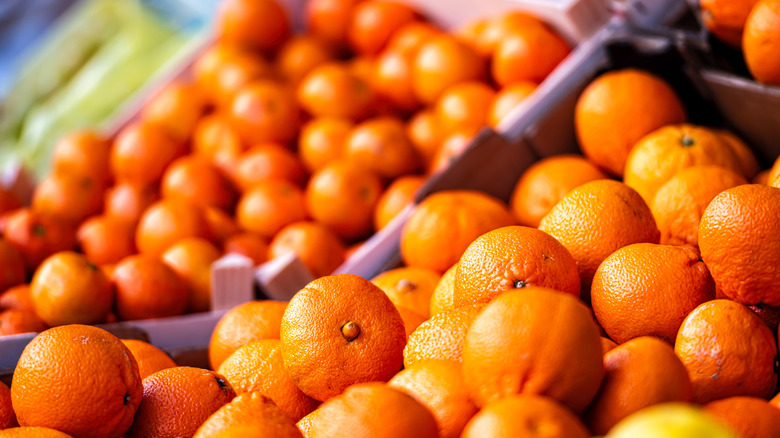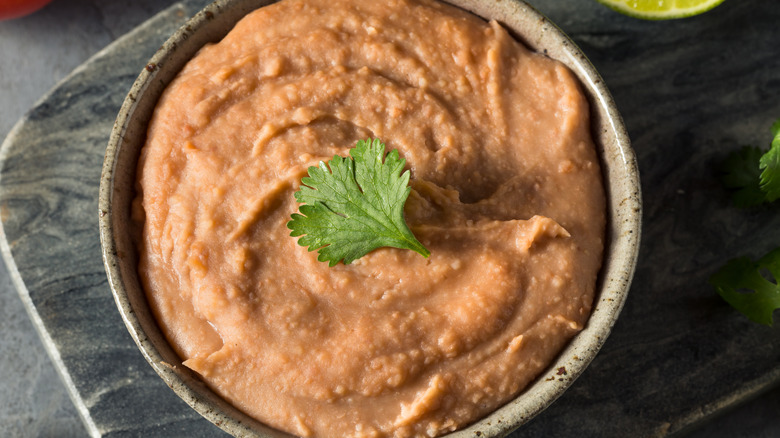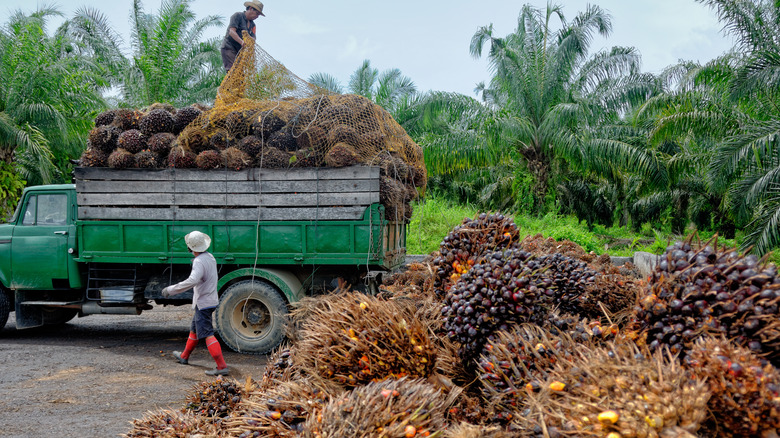17 Foods That Seem Vegan But Aren't
Because of the increased demand for plant-based products, everything from seltzer water to dish deterrents seems to have a big old "plant-based" label slapped across the front. Unfortunately for vegans, "plant-based" doesn't necessarily mean the product is safe to buy. And even foods that seem obviously made from plants might contain additives or preservatives made with animal byproducts. Because it's so confusing, it's important to research the unexpected foods that seem vegan but aren't and to give yourself a break when you misstep.
It's important to keep in mind that nobody is perfect. Even the strictest of vegans unknowingly consume or use animal-based products now and again. The philosophy is that vegans, to the best of their ability, try to avoid products that cause harm to animals. This may mean not wearing leather shoes, using soap with goat's milk, avoiding foods with animal byproducts, or even selecting sustainably sourced ingredients for cooking. Education is the strongest tool, so read labels, research, and avoid the following foods.
Worcestershire
Worcestershire sauce is more than just your average hard-to-pronounce condiment. It's a refrigerator staple used in endless recipes to add a salty, vinegary pizzaz. The condiment is often used to marinate meats, enhance stir-fries, and flavor salad dressings and other sauces. Worcestershire has a multifaceted flavor combining sweet, savory, salty, tangy, and umami.
The umami flavor comes from both the soy sauce and the anchovies. Anchovies are small salty fish, which is, of course, the main reason why Worcestershire sauce is not suited for many diets. For those who love the intangible boost that the condiment adds to all it comes in contact with but want to stick to a vegan diet, try looking for brands that do not contain anchovies. These will often be labeled as "vegan Worcestershire" or may don a "plant-based" label. Alternatively, follow a recipe to make your own sauce at home.
Thai curry
Vegans find themselves in heaven when it comes to cuisines from certain parts of the world. While American, German, and British foods tend to leave little option for the animal-conscious, Asian, Latin American, Mediterranean, and most African cuisines are plant-heavy. However, when out to eat at Asian restaurants, keep in mind that fish sauce is often used in stir-fries, curries, and sauce.
Tofu or vegetable curry, even when listed under the vegetarian section, often contains fish sauce. Be sure to ask your server if the dish you're interested in contains a dark sweet sauce. If it does, oftentimes, they can offer you a version without it. When in doubt, have them recommend a vegetarian dish made without fish sauce and enjoy.
Or, get busy in the kitchen and make your own Thai green curry paste recipe at home and enjoy it just how you want it, fish-free and vegan.
Miso soup
While miso soup may seem like another safe option when it comes to dining out or even buying instant packets at the grocery store, be wary of the ingredients. Look for words like "bonito" and "dashi" along with more obviously labeled "fish flakes." Bonito is a form of smoked fish that has been shaved into flakes and dehydrated. When sprinkled on top of food, the flakes move around as if alive, but it's simply the thin flakes reacting to the heat of the dish in combination with the chill of the air.
So what exactly is dashi? Dashi, on the other hand, is an umami broth made with both kelp and bonito. It's rich, savory, and quite popular in Asian cuisine. Miso soup often contains dashi or bonito, so be sure to ask your server if you're out to eat and let them know you don't eat fish.
Candy
Junk food-enjoying vegans are perpetually irritated by the bizarre animal-based ingredients found in candy. Many candies aren't even considered vegetarian, which may be a little mind-blowing for those who don't know about the wonders of gelatin or shellac.
That gooey texture of gummy bears and starbursts isn't just made from the sticky goodness of sugar. Instead, it's made with gelatin, a substance derived from boiled animal parts, including ligaments, tendons, or skin — mostly of pigs and cows.
But the fun doesn't stop there. Shellac, on the other hand, is made from the secretion of a lac bug, is often labeled as "confectioners glaze," and can also be found in wood varnishes or candle coatings. Check out the color of your candy as well. Red dyes are also made from insects. Look for the words "carmine," "cochineal," or "additive number 120" in your candy, lipstick, or even canned cherries. Try red food coloring substitutes when making food at home, and just to be safe, look for the vegan-verified label on your next bag of candy.
Nonorganic sugar made in the USA
This may be a huge shock even for non-vegans, but a great deal of sugar produced in the United States is not considered vegetarian. Sugar can be found in almost any processed food these days, so if you're vegan, pay attention and listen up. Sugar is not always vegan or vegetarian, even if labeled "plant-based," because certain production processes use animal products.
Some companies purify their sugar with bone char to give it that bright white color. This char is made from cattle bones and, of course, can not be considered a humane ingredient. Look for organic sugars, sugars that are not purified, imported sugars, and for sugars that are vegan-certified. Stay on the lookout for sugar purified with "natural carbon," which is just another fancy way to say bone char without sounding so, well, gross and blunt.
Keep this in mind when you're buying processed foods with "sugar" listed as an ingredient, and remember that not all sugars are made using the same methods. As you may imagine, sugar is a tough food to avoid altogether, but if you do most of your own cooking and baking, you may be in the clear.
Beer and wine
It seems like nobody is safe when it comes to avoiding animal products these days. Even trying to kick back with a glass of wine or an ice-cold beer after a long day can prove problematic to the vegan lifestyle. While the basic ingredients of these popular alcoholic beverages are plant-derived, the purification process often involves a whole set of ingredients that you might never have expected.
White wine often uses fish bladders, referred to as "isinglass," to clear any cloudiness from the beverage. Similarly, egg whites, fish oil, gelatin, chitin (fiber from crustation shells), and even casein (milk protein) can be found in popular beer and wine brands because of their use during processing. Luckily, vegan-conscious brands that believe in using only the purest ingredients are leading a charge to decrease the amount of processing and additives included in brewing and winemaking. Educate yourself on the best vegan wines and beers, and look for the vegan certification on the label.
Honey
There has been much debate about whether honey makes the cut as a vegan product or not. The truth is, it is wishful thinking to believe honey isn't an animal byproduct. Bees work incredibly hard to produce honey; it's made from nectar that they've chewed and then spit into honeycombs, where it evaporates into a thick, sticky substance. In fact, it takes 12 worker bees their entire lifetime to make one spoonful of honey. They produce this honey so they can survive the winter. Bee farmers remove this honey and supply them with sugar syrups that aren't nearly as nutritious or delicious (or else we'd eat it instead).
During honey extraction, even the most gentle beekeepers are prone to crush and harm hard-working bees. If you're unsure if something is vegan or not, consider if the animal intended to make it for you or if it serves another purpose. In this case, bees do not make honey for humans to stir into their tea. But luckily, there are plenty of incredible substitutes that every vegan should know, including agave and maple syrup, that seem to hit the spot just right.
Bread
It can be kind of a creepy notion that so many foods seem vegan but aren't. Even when reading labels thoroughly, those hard-to-pronounce words might as well be hieroglyphics if you don't have Google at the ready. Perhaps the most surprising of all is the additive called L-cysteine which can be made from a truly shocking and even cannibalistic ingredient.
Also known as "dough conditioner," L-cysteine is an amino acid that helps speed up production and is often used in large-scale bread-making operations. And although it can be synthesized, it's most often made from duck feathers and, wait for it, human hair follicles. The hair itself is dissolved in acid, and the L-cysteine is extracted. But it's not just bread; this additive can also be found in pizza crusts, tortillas, bagels, and even pastries. When it comes to bread, it might be worth it to splurge on some locally made bread or small-batch brands, and although you won't get an actual mouthful of hair with the generic brands, it's a pretty hard image to shake.
Marshmallows
There's nothing better than gathering the family around a campfire to sing songs, tell ghost stories, and make ooey-gooey s'mores. Although vegans might be opting out of the American campfire delicacy because of the honey in graham crackers, or the milk in chocolate, there's yet another reason they should be wary, and vegetarians should hop on board.
While they look and taste like puffed vanilla sugar, the reason marshmallows usually aren't vegetarian-friendly is that they're made with gelatin. Gelatin is made from boiled pig and cattle parts like skin and ligaments. It's what gives marshmallows that fluffy, gooey texture that we all love so much. Luckily, some brands make vegan marshmallows, so keep your eyes peeled for the vegan verified label. If you can't find vegan marshmallows at your local grocery store, turn to the handy-dandy internet and order some online.
Breakfast cereal
Breakfast cereal is made from grains and sugar, right? Pour it over a bowl of oat milk, and you have yourself a quick and easy cruelty-free breakfast! Think again. Unless distinguished as vegan-certified, many fortified cereals aren't even vegetarian. Why do they always have to go and ruin a good thing? In order to fortify them with vitamin D, they often contain sheep wool and sheep grease, which is certainly not plant-derived.
Lanolin is a greasy substance derived from rolling sheep wool that has been processed and concentrated. It contains high quantities of vitamin D and is used as a supplement. While D2 is typically a safe bet for vegans, keep your eyes peeled for fortified foods containing D3, which can come from varying sources. The only real way to tell if the supplement is vegan-friendly is to call the manufacturer. For ultra-conscious vegans, steer clear unless it's been vegan-certified or does not contain fortified ingredients.
Roasted peanuts
Peanuts are an easy protein-packed snack for vegans on the go. They might be your only option at a convenience store besides potato chips or water. Both vegetarians and vegans should be cautious when buying peanuts from major brands because, many times, they contain ingredients like gelatin or lard. Popular brands like Planters Dry Roasted Peanuts contain gelatin and are unsuitable for vegans. They use it to help the salt and spices stick to the nut when they aren't roasted in supplemental fats like peanut oil.
Lard, on the other hand, is used in some peanut butter brands. Extra smooth peanut butter can contain up to 10% lard, whereas the maximum used to be double that. Vegans and vegetarians alike should always read the labels, even when it seems there's no way it could contain animal products. Companies certainly tend to surprise us with wacky ingredients and keep us on our toes. Sorry to disappoint!
Juice
It's safe to say that juice is made almost entirely from fruit. With some brands, we see stabilizers, added vitamins, nutrients, and of course, every form of sweetener under the sun. But it seems that animal products would be off the table. Unfortunately, unless you squeeze it yourself, look for the vegan verification label, or thoroughly review the ingredients list, there is no promise that your juice is vegetarian.
Some brands contain gelatin which helps to clarify juice and remove the natural cloudy appearance. In addition, sheep's wool, grease, and fish oil are common additives to fortified juices containing vitamin D3. Consider opting for some good old sunshine for your vitamin D intake and sticking to brands without additives.
Jell-O
While it's common knowledge to some that Jell-O contains gelatin (hence the name), it's not something we like to think too much about. Breaking it down, that sugary glob of brightly colored goodness is actually made from animal parts that have been boiled into a gelatinous substance that we can't seem to get enough of.
There's plenty that you need to know about gelatin if you're sticking to a vegetarian diet. The first thing is why gelatin creates such a pleasing texture. Thanksgiving enthusiasts know that after gravy has been chilled overnight, it forms a gelatinous blob. The gelatin in Jell-O work just about the same way, only it's mixed with fruity flavorings and enough sugar to mask any residual animal flavoring. Unfortunately, gelatin is found in more than just jello, so keep your eyes peeled for it on ingredient lists.
Sprinkles
Being a vegan is much easier today than it was a decade ago. Even Ben & Jerry's makes 40% of its flavors from almond milk. So when it comes to ice cream, even your most basic grocery store will have plenty of vegan options. Take caution when loading up on toppings from your Sundae bar or ice cream stand.
Shellac, also known as confectioners glaze, is a product made from insects found in candy, including sprinkles. In fact, it's the strange ingredient used to make jelly beans shiny. It's often listed as "natural glaze" or "pure food glaze" and helps to coat sprinkles to stay fresh and prevent them from sticking together.
Female lac bugs secrete a substance processed into the shellac, which may seem unusual, but surprisingly enough, it's used in plenty of foods. Keep reading those labels.
Fruit
So it seems almost all processed foods are off the table. Great. Looks like we can just stick to the produce section and satisfy our sweet cravings with an orange. Take caution. Many fruits, especially citrus fruits, are coated in beeswax or a blend of beeswax and shellac. This helps to preserve the fruit and to add a shine. As we know, shellac is made from insect excretion. Beeswax, on the other hand, is made by worker bees.
Female bees can turn the honey that they produce into wax. The wax is used to make combs in their hives. These combs act as a place for their young before they fully develop and as a place to store pollen and honey to sustain them during the winter months. Therefore, beeswax is not vegan because it's an animal byproduct, and we are disrupting and harming animals by removing it from hives.
Refried beans
Beans are a vegan's best friend. They're loaded with protein and healthy fats, packed with nutrients, and are a hearty substitute for meat in almost any dish. South American cuisine relies heavily on legumes, as bean tacos and burritos are filling entrees. Beans and rice make a healthy side dish that can accompany most meals. That doesn't mean, however, that they are made only from plants.
Most refried beans are made with lard. Lard is animal fat which gives them that silky, fatty, salty flavor. Lard can be found in pastries like pie crusts and most name-brand refried beans. Inquire with your server if the refried beans in your dish are vegetarian, and when you're in the canned bean aisle of the grocery store, look for "vegetarian refried beans." Home cooks might be interested in making their own vegetarian refried beans using plant-based fat like olive oil instead of lard.
Palm oil
Palm oil is one of those products that is up for debate in the vegan community. Palm oil itself comes from the fruit of palm oil trees. As palm oil increases in popularity, the plant is grown and harvested across the globe in warm climates, although it originated in Africa. So if palm oil is made from plants, why is it so problematic? Hardcore vegans know that animal cruelty goes beyond what's found in the food; destruction caused in the process is just as detrimental to animals' lives.
The palm oil industry is a major cause of deforestation, which destroys animal habitats. Orangutans have become the poster child for palm oil extraction because of the harm it has caused the endangered species. Pygmy elephants and Sumatran rhinos are also affected greatly by the industry, so much so that they could very well soon become extinct. Vegans aren't ready to take this sitting down and often look for sustainably sourced palm oil on ingredients lists or just avoid it altogether. Ethically sourced ingredients are always the better option when it comes to the vegan diet, which is why Oreos, deemed "accidentally vegan," are actually not vegan at all.
